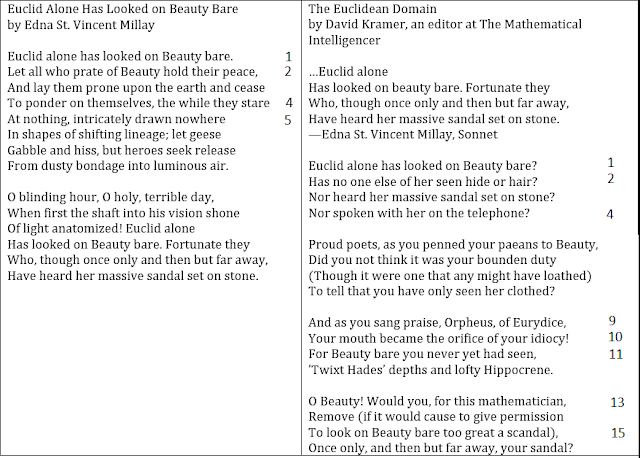Euclid was a Greek mathematician from Alexandria, Egypt around 300 BCE. There is almost nothing known of his life and no first-hand descriptions of his physical appearance (The Story of Mathematics, n.d.). Euclid is often referred to as the “Father of Geometry” as he wrote the textbook, “Elements”, which represents the “peak” of mathematics up until that time in Greece. He also wrote on division of geometric figures into parts in ratios, mathematical theory on reflection, determining location of objects on the celestial sphere, and texts on optics and music (The Story of Mathematics, n.d.). The Elements was a compilation and explanation of all known mathematics containing 465 theorems and proofs; Euclid reworked math concepts of his predecessors and this field became known as Euclidean Geometry. His five general axioms where: 1) things which are equal to the same thing are equal to each other; 2) if equals are added to equals, the wholes (sums) are equal; 3) if equals are subtracted from equals, the remainders (differences) are equal; 4) things that coincide with one another are equal to one another; 5) the whole is greater than the part (The Story of Mathematics, n.d.). Among other things, Elements also contains information number theory; specifically, the Fundamental Theorem of Arithmetic and proof that there are infinitely many prime numbers.
In Millay’s poem, I think she refers to ‘Beauty bare’ as an actual entity, hence why ‘Beauty’ is capitalized. From lines 1 and 2, I think she references Euclid is the only one who looks at ‘Beauty’ because he is the “Father of Geometry” and tells others who talk foolishly about ‘Beauty’ to “shut up and stop talking.” Lines 4 and 5 refer to these people not being able to see the shapes Euclid sees.
In Kramer’s poem, he
implies that ‘Beauty bare’ is embodied as a woman and questions if no one else
has seen her naked (Lines 1 and 2) or heard her (Line 4). Kramer then critiques
Millay’s poem by comparing the words coming out of her mouth as idiocrasy to Orpheus,
a musician and poet in Greek mythology, who tried to bring his dead wife
Eurydice back to life through music (Lines 9 and 10). Kramer then claims that
Millay has not seen ‘Beauty’ herself (Line 11). It then appears that Kramer
then asks the entity of ‘Beauty’ to then remove Euclid from the history of
famous mathematicians (Lines 13-15). Kramer may be questioning the importance
Euclid has in the history of mathematics; Euclid’s main contribution to
mathematics was summarizing and compilating other work of mathematicians before
him and being given credit as the “Father of Geometry” and founder of Euclidean
geometry.
References:
The Story of
Mathematics, n.d. Euclid of Alexandria – The Father of Geometry. Retrieved
October 21, 2020 from https://www.storyofmathematics.com/hellenistic_euclid.html.

Thanks for this very thoughtful analysis of the poem in light of the history of Euclid's mathematics! I think that two of your speculative interpretations of the Kramer poem may not be correct though: in lines 11 and 12, I think Kramer is still talking to Orpheus, rather than to Millay (although Orpheus DOES stand in for all poets, in a way!). And in Kramer's last stanza, I think he is taking rather a long time to request that Beauty remove just one sandal for him (Kramer) to see at least her bare foot, from a distance! Nevertheless, I appreciate your good work on interpreting these somewhat cryptic lines.
ReplyDelete